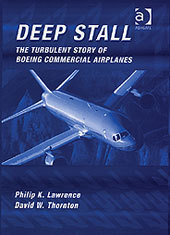Deep Stall The Turbulent Story of Boeing Commercial Airplanes
Auteurs : Lawrence Philip K., Thornton David W.

Date de parution : 10-2005
15.6x23.4 cm
Date de parution : 02-2017
15.6x23.4 cm
Disponible chez l'éditeur (délai d'approvisionnement : 14 jours).
Prix indicatif 61,25 €
Ajouter au panierThèmes de Deep Stall :
Mots-clés :
Boeing Commercial Airplanes; boeing; Bill Boeing; commercial; Large Commercial Aircraft Industry; airplanes; GATT Subsidy; aircraft; Large Commercial Aircraft; Sonic Cruiser; Commercial Aeronautics; Single Aisle Aircraft; Air Mail Contracts; AI; Fan Jet; Commercial Aircraft Sales; Federal Aviation Administration; Commercial Aircraft Industry; Air Mail Act; SST Program; De Havilland Comet; Air Mail Service; Air Mail; AAF Official; Farnborough Air Show; West Germany; Existing Market Opportunities; SST; Kill Devil Hills



